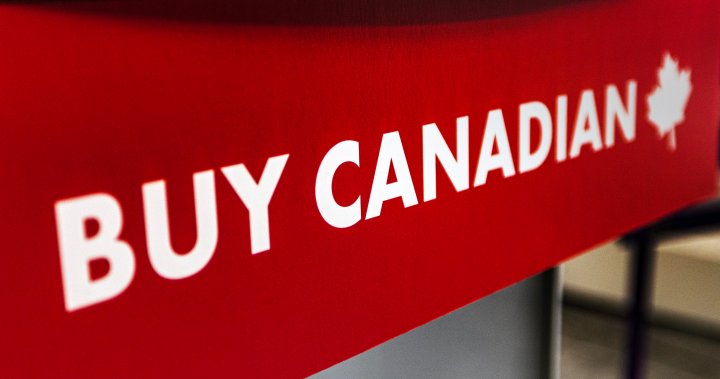The “Buy Canadian” movement is sending new ripples of concern through the executive offices of U.S.-based consumer companies that banked on selling their products on Canadian retail shelves.
California-based diaper maker Parasol Co had been working since January with a distributor to expand the sale of its diapers and baby wipes to new retailers in Canada, including convenience stores, CEO Jessica Hung said.
But, in early March the distributor, who Hung declined to name, halted work on the deal, she said, because of growing anti-American sentiment in Canada.
“They were instructed by a retailer to pause any American brand launch,” Hung said, referring to the distributor. “They told us they would re-evaluate when market conditions allow.”
“That’s the kind of disruption we would never expect,” said Hung. “I never heard of this happening until now. It’s definitely quite a bit of headwinds.”
A dramatic reshuffling of Canada’s retail shelves illustrates the impact of patriotic consumerism in Canada, which imported nearly US$350 billion of products from the United States in 2024, making it its largest trading partner.

U.S. President Donald Trump’s jabs to annex Canada, the imposition of a 25 per cent levy on steel and aluminum from Canada and threats to tax all other imports from the country have prompted a rallying cry among many Canadian shoppers to eschew U.S.-made products.
Parasol, which sells its products primarily online and at Target stores in the U.S., was working on labeling its packages in French for Canadian shoppers, Hung said. She added that she had already begun making decisions about which specific products would be part of the now-scrapped Canada distribution agreement.

Get daily National news
Get the day’s top news, political, economic, and current affairs headlines, delivered to your inbox once a day.
Shopper Rebecca Asselin, a mom and health insurance professional from Saint-Jean-sur-Richelieu, Quebec, has been using social media to share her story about her search for Canadian products.
She told Reuters she recently switched to purchasing Royale diapers, made by Irving Personal Care of Moncton, New Brunswick, one of the only manufacturers of baby diapers and training pants in Canada. “I never really considered before where diapers were made, but apparently, Canadian-made diapers are kind of hard to come by. That’s a big change for us.”
Irving Personal Care said retailers from all over Canada have been reaching out to discuss increasing distribution.
“As the only branded baby diaper made in Canada, our weekly shipments have quadrupled,” Jason McAllister, Irving Personal Care’s vice president of business operations, told Reuters.
Drinks and citrus imports
The Buy Canadian movement is not just hampering one diaper business but also drinks and citrus fruit from the U.S., companies say. In early March, Jack Daniel’s maker Brown Forman BFb.Ncalled the removal of American bourbon and whiskey from Canadian liquor stores worse than Canada’s retaliatory tariffs and a disproportionate response to Trump’s levies.
A source familiar with California’s citrus fruit exports told Reuters in early March that Canadian retailers have canceled their orders.
GT’s Living Foods, based in Los Angeles, California, and known for its Synergy kombucha products, said retailers in Canada, including Walmart, have been placing orders for fewer products because of tariff uncertainty.
“The distributors for Walmart Canada, Loblaw’s, Metro and Sobey’s told us they will buy one truck instead of two trucks of products, because retailers are being cautious and they are waiting to see how this (tariff situation) will play out,” said Daniel Bukowski, who managed the accounts of these retailers for GT’s Living Foods and was senior vice president of sales until mid-March.
Walmart said it “will continue to work closely with suppliers to find the best way forward during these uncertain times.”
Loblaw’s and Sobey’s did not respond to Reuters requests for comment.

Metro said it prioritizes local Canadian products whenever possible. “Our intent is not to remove American products from our shelves if the tariffs take effect, we will evaluate as we do currently, all product listings with the intent to offer the best value and products,” a spokesperson said.
Demeter Fragrances, a small family-owned and operated business that manufactures perfumes in Pennsylvania, said it halted its plan to expand into Canada in 2025. “Canadian sentiment has turned away from American product,” said Mark Crames, Demeter Fragrances’ chief executive officer. “Consequently, it seems like a wasted effort and, we simply scrapped the initiative.”
Grime Eater Products Limited, a Canadian manufacturer of Response and Luster Sheen hand cleaning products, had been trying unsuccessfully for years to get Canadian Tire to stock its products, according to Vice President Tracy Hayes.
With the Buy Canadian movement spreading, she said, “The future looks promising.”
That’s because she learned from a buyer at Canadian Tire, the operator of 504 stores in Canada, that it was considering reducing its offerings of her company’s U.S. rival, Fast Orange, a hand cleaner brand manufactured by Permatex.
Permatex and Canadian Tire were not immediately available to comment.
(Reporting by Siddharth Cavale in New York and Nivedita Balu in Toronto; additional reporting by Jessica DiNapoli in New York; Editing by Aurora Ellis)
U.S. companies say Canadian retailers are turning away products





